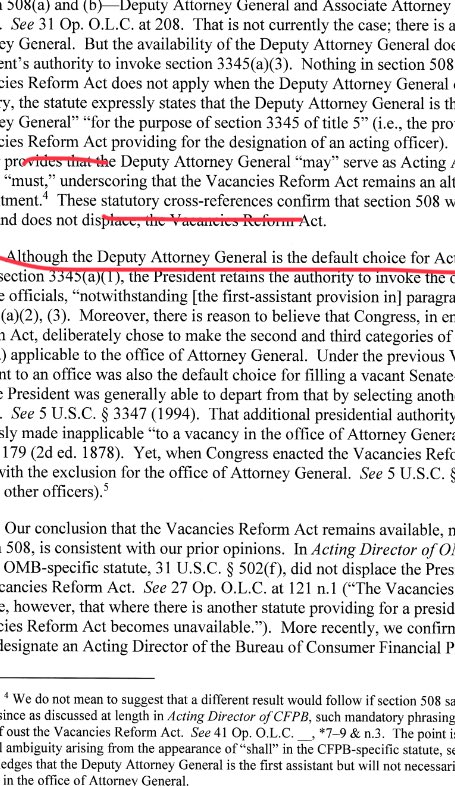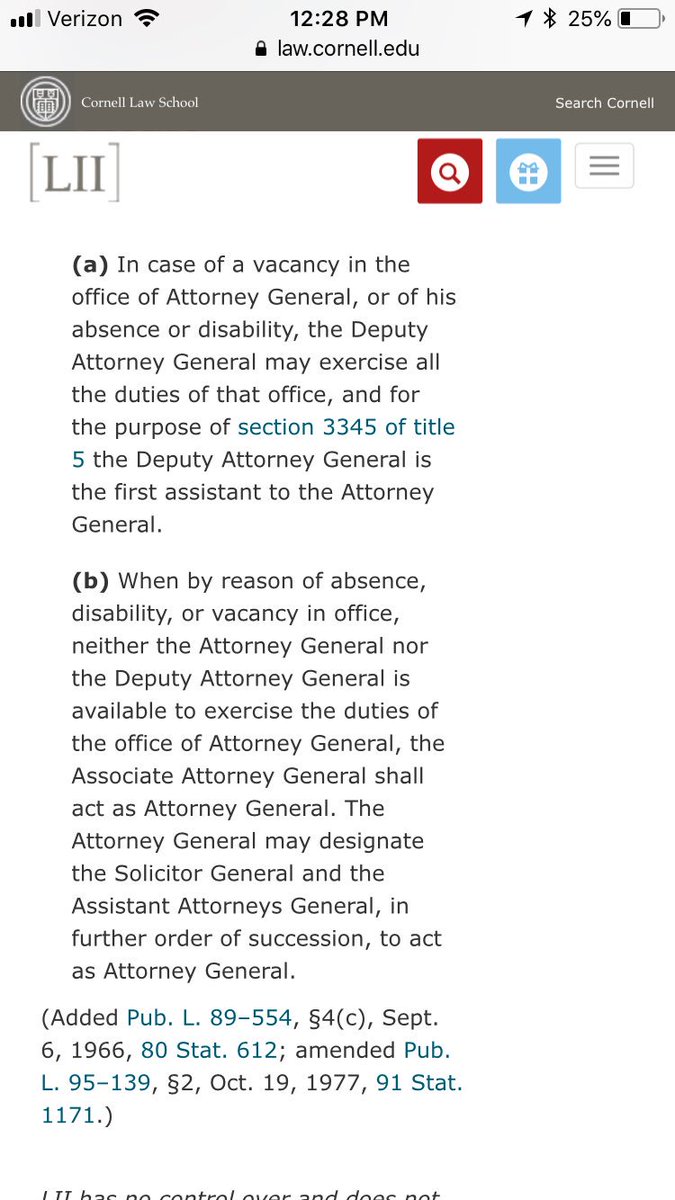I think I caught a major legal error on p. 5 of the OLC memo on #Whitaker.
OLC argues that the Vacancies Act applies to DOJ statute 28 USC 508, because the DOJ statute cross-refers to the VRA.
That would be difficult b/c Congress passed 28 USC 508 before the VRA. See my thread:
OLC argues that the Vacancies Act applies to DOJ statute 28 USC 508, because the DOJ statute cross-refers to the VRA.
That would be difficult b/c Congress passed 28 USC 508 before the VRA. See my thread:
https://twitter.com/jedshug/status/1062542808106655745
This is the part of the memo with the error. This DOJ statute (28 USC 508) was passed and amended in the 1940s, 50s, 60s, 70s, 80s. No later changes. The 3345 reference pre-dated the VRA.
VRA passed in 1998.
It would be impossible for the DOJ statute to “cross-reference” the VRA.
VRA passed in 1998.
It would be impossible for the DOJ statute to “cross-reference” the VRA.

This site makes the legislative history of 28 USC 508 clear:
Enacted 1966.
Amended 1977.
So how could it “cross-reference” a 1998 statute?
How could Congress indicate any intention in 1977 about something that did not exist yet? law.cornell.edu/uscode/text/28…
Enacted 1966.
Amended 1977.
So how could it “cross-reference” a 1998 statute?
How could Congress indicate any intention in 1977 about something that did not exist yet? law.cornell.edu/uscode/text/28…

4/ And constitutional questions about the OLC opinion:
OLC insists Whitaker's appointment is OK b/c he's inferior, not principal, citing Edmonds, p.16:
"An inferior officer is one who reports to a superior officer below the President." How is that possible here with Whitaker?...
OLC insists Whitaker's appointment is OK b/c he's inferior, not principal, citing Edmonds, p.16:
"An inferior officer is one who reports to a superior officer below the President." How is that possible here with Whitaker?...
5/ OLC cites some recent historical examples. Sorry, I thought we were supposed to be textualist and originalists.
It seems like the Constitution's "department heads" (e.g. the AG) should not be so easily re-labeled "inferior." To textualists, this should be absurd.
It seems like the Constitution's "department heads" (e.g. the AG) should not be so easily re-labeled "inferior." To textualists, this should be absurd.
6/ The Constitution refers to principal officers and inferior officers in Article II, Section 2:
Cl. 1: "He may require the Opinion, in writing, of the principal Officer in each of the executive Departments."...
Cl. 1: "He may require the Opinion, in writing, of the principal Officer in each of the executive Departments."...
7/ Art. II, Sec. 2, Cl. 2, The Appts Clause: "the Congress may by Law vest the Appointment of such inferior Officers, as they think proper, in the President alone, in the Courts of Law, or in the Heads of Departments."
The text are clear: Heads are principal officers. Full stop.
The text are clear: Heads are principal officers. Full stop.
8/ Whitaker is the head of the DOJ, acting or not. If you tell me that he's not a principal officer, if you take the Constitution seriously as law, you need to reconcile that with the actual words of the Constitution, not recent practice.
9/ And if you tell me that Whitaker is somehow an "inferior" officer, and not a "principal" officer, despite the text of Art. II, Sec. 2, then you need to explain what the difference is functionally. That cannot be just a distinction without a difference, an empty game of labels.
10/ If you cite Eaton for "special" circumstances, acknowledge Eaton was about a sick consul to Thailand in *1898.* Not 1998. It was a health emergency. It was not the head of a department. There were no other Senate-confirmed options.
This is an emergency of Trump's creation.
This is an emergency of Trump's creation.
• • •
Missing some Tweet in this thread? You can try to
force a refresh







